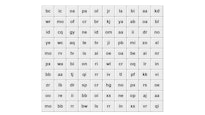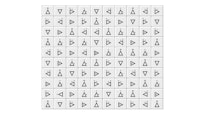Concentration Test in 2025
- What Is a Concentration Test?
- When Are You Likely to Encounter a Concentration Test in 2025?
- What Does a Concentration Test Assess?
- What Types of Concentration Tests Are There?
empty
empty
empty
- Concentration Test - Example Questions (2025)
empty
empty
empty
- Preparation Tips for Concentration Tests
- Final Thoughts
What Is a Concentration Test?
A concentration test is a type of timed psychometric screening assessment which is used by employers as part of an interview process to look at a candidate's ability to work systematically and carefully, with high levels of concentration for an extended period.
It works like a concentration check where employers have a way on how to test the attention span attention span of their applicants.
When Are You Likely to Encounter a Concentration Test in 2025?
In a working environment where there are potential safety risks, concentration is vital.
This is why some employers will require potential employees to undertake a series of concentration tests, such as a train driver DOT test, SCAAT test, and group bourdon tests.
Suppose the position you have applied for requires competencies in repetitive actions and high concentration levels, especially in a potentially hazardous environment.
In that case, employers may choose to use different types of tests, such as this.
The results of a focus test such as this help businesses to make sure that they choose a candidate capable of meeting their requirements.
What Does a Concentration Test Assess?
Many things are considered when an employer looks at the result of a concentration or focus test.
Three of the most common skills which employers are looking for in a potential employee are:
-
Level of alertness – The primary aim of a concentration test is to measure a candidate's ability to remain alert, even when performing repetitive and potentially boring tasks
-
Assessment skills – A candidate's ability to assess problems is vital to them being able to find solutions. A focus test will look at how well individuals can solve the questions they are given. They may include logical reasoning and numerical reasoning tests.
-
Organizational skills – Having a high level of organizational skills would usually indicate an ability to concentrate for longer periods
What Types of Concentration Tests Are There?
The most common focus tests for individuals to be asked to take are the Group Bourdon and SCAAT tests.
Group Bourdon Tests
This test can be administered in both an electronic and paper format.
You may be able to find out which version you are taking ahead of the assessment, which will help you to prepare for it.
During the assessment, you will be shown five tables or charts, which are typically 25 x 21. These will either have letters or dots in a variety of groupings.
You will be asked to find specific sets of groupings within those charts. These will usually be in groups of four.
The aim is to mark each of the groupings that you have been asked for within the time limit.
The time limit for this assessment is 10 minutes, so you will essentially have two minutes to find all of the required groupings on each chart.
SCAAT Tests
The SCAAT test is one of the world's leading assessments when it comes to needing to evaluate concentration.
Because of this, it tends to be more widely used by transport companies.
During this assessment, you will be given three sets of exercises to complete. Each of these sections will then be split into three individual sheets of questions.
Candidates are given one minute to complete each sheet. This focus test is often completed electronically, and the sheets will automatically move on when your time is up.
Set 1: In a similar way to the Group Bourdon test, you will be required to find a specific symbol within a page of shapes or letters. This has been described as finding a needle in a haystack. There will be one symbol to find per sheet.
Set 2: The second stage of the test moves things up a notch. Rather than finding one symbol, candidates are now required to find two symbols within the same time frame.
Set 3: The final stage of the assessment means that you will need to find a specified symbol as in the previous sections. In addition to this, you will need to find a changing shape within each line of symbol.
It is not expected that candidates should finish the whole assessment. But it is important to complete as many questions as you can.
miniSCAAT
This particular focus test is a smaller and shorter version of the main SCAAT test. It is typically used as a pre-shift test for employees to make sure they are able to operate safely during their working hours.
It can also be used as part of a recruitment process to weed out any candidates who are likely to struggle with the full test.
Concentration Test - Example Questions (2025)
Example One: Group Bourdon
This is a reduced-size chart, but it will give you some idea of what to expect during the Group Bourdon test. This is also similar to the style of question which you will find during the first stage of the SCAAT test.

The objective in this example is to find the 'aa' symbols.
Example Two: Group Bourdon Test
This is a reduced-size chart, but it will give you some idea of what to expect during the Group Bourdon test. This is also similar to the style of question which you will find during the first stage of the SCAAT test.

The objective in this example is to find the ᒦ symbols.


The objective is to find the following symbols: ᐈ and ᐗ
Preparation Tips for Concentration Tests
Step 1. Find Out Which Focus Test You Will Be Taking
Preparing for any concentration check assessment will always start with knowing exactly which assessment you will be taking.
Sometimes, a potential employer will tell you when they offer you an interview and outline the interview process.
If they don't, then it is perfectly acceptable to ask for details. This means that you can research the assessment ahead of time.
Step 2. Practice Tests
Once you know which assessment you will be taking, the next step will be to take some practice focus tests.
This is useful as it will help you to understand the potential formats of questions that you may see in the real test.
It will also help to familiarise yourself with the type of questions that you may be expected to answer.
Many websites will offer sample questions and practice tests.
You may need to pay for the full-length version of assessments. Still, often you will have the opportunity to take a few practice questions, or a shortened version of the test, for free.
You can access practice questionnaires through the wikijob links throughout this article, along with jobtestprep.
Step 3. Be Prepared for Repetitive Questions
The focus test is designed to measure your ability to concentrate even in boring situations.
Because of this, the questions you find within a concentration test are likely to be repetitive and potentially boring.
Step 4. Practice Against the Clock
Concentration tests will always be timed.
Your score will be based not only on how many correct answers you give but also on how many questions in total you are able to answer within the time limit.
Taking practice papers that are timed will help you make sure that you are answering promptly and accurately, which will lead to better scores overall.
Step 5. Remove Distractions Where Possible
You may be asked to complete the focus test at an assessment center, in which case it will be done under test conditions and with very few distractions.
It is possible, however, that you will be asked to complete it remotely at a time of your choosing.
In this case, it is always a good idea to make sure that you are able to take the test somewhere quiet, where you have no distractions.
This will mean that you are more able to concentrate.
Step 6. Practice Relaxation Techniques if You Are Nervous Before Your Focus Test
Nerves can affect your ability to focus.
If you are someone who generally finds focus tests and assessments stressful, then it might be a good idea to practice some mindfulness and breathing techniques.
These may enable you to better focus on the task at hand.
Step 7. Get Enough Rest
It is always a good idea to get enough rest before any kind of assessment.
It is particularly important for assessments that require a lot of concentration as being tired can affect your ability to focus.
Make sure that you get a good night's sleep the night before you take a concentration test to feel at your best.
Final Thoughts
Concentration is vital in some lines of work where it can mean the difference between being able to operate safely or not.
Avoid letting your nerves get the better of you by researching the assessment you are being asked to take and practicing ahead of time.
This will enable your natural focusing skills to be shown to the best of your ability.







